RASC News Agency: The Malala Fund, a global champion of girls’ education, has announced the launch of a bold five-year initiative aimed at dismantling the systemic and institutionalized discrimination against women and girls in Afghanistan a reality the organization unequivocally terms gender apartheid. This term, deliberately employed, underscores the severity of the Taliban’s deliberate, state-sanctioned campaign to erase women from public life and intellectual participation. Running from 2025 through 2030, the initiative represents one of the most coordinated and determined efforts yet to challenge the Taliban’s repressive gender policies, which have turned Afghanistan into the epicenter of modern-day misogyny. The Malala Fund’s plan brings together legal, educational, humanitarian, and diplomatic strategies to reverse what it describes as “a deliberate, calculated assault on the identity and autonomy of Afghanistani women.”
At the heart of this campaign is the recognition that meaningful change must begin from within by empowering Afghanistani-led organizations, civil society actors, and educational advocates who have not surrendered their commitment to justice, even in the face of severe persecution. The Malala Fund argues that addressing the educational crisis imposed by the Taliban cannot be achieved through foreign policy statements alone. It demands localized, culturally informed action led by those most intimately affected.
In a sweeping legal move, the Fund is also working to internationalize gender apartheid as a recognized crime against humanity. By doing so, it seeks to embed the Taliban’s abuses into the global legal lexicon not as cultural or religious practices to be understood, but as criminal acts to be prosecuted. This campaign aims to create a framework of global legal accountability, wherein Taliban leaders and enforcers could ultimately be held liable under international law for their deliberate dismantling of women’s rights.
Simultaneously, the initiative seeks to amplify the voices of Afghanistani women at the highest levels of international discourse. Too often, discussions about Afghanistan take place without the inclusion of those most affected by its descent into gender tyranny. The Malala Fund is investing in the visibility and participation of Afghanistani women’s rights defenders in multilateral forums, working to ensure that their testimonies become central to shaping international responses, sanctions, and aid policies.
Acknowledging the immediate humanitarian crisis, the Malala Fund is also directing emergency financial support toward displaced female students and women who have been forced into exile by the Taliban’s brutal policies. These women, many of whom were previously teachers, students, and professionals, now find themselves stateless, often threatened with deportation from host countries. The Fund has called on all governments to halt the forced repatriation of Afghanistani refugees and to instead increase protections for those fleeing systemic persecution.
In its latest report, the Fund warns that what is occurring in Afghanistan is not a transient political crisis but the construction of a deeply embedded architecture of gender-based repression. “This is not merely the erosion of rights,” the report states. “It is the institutionalization of subjugation, carried out with ideological fervor by a regime that views educated women as existential threats.” The initiative is bolstered by a growing global coalition. The Malala Fund has forged alliances with organizations such as the Nelson Mandela Foundation, legal advocacy groups in the United States, and South African civil rights movements to frame the Taliban’s actions within the historical context of apartheid a calculated system of exclusion that demands an equally forceful, globally coordinated resistance.
In a pointed call to the international community, the Malala Fund urges not only rhetorical condemnation but tangible, sustained action. It calls on governments, international bodies, and civil society institutions to uphold their commitments to human rights by isolating the Taliban diplomatically, enforcing targeted sanctions, and supporting grassroots resistance within Afghanistan. “The world must not normalize the erasure of women,” the Fund declares. “Standing with the women of Afghanistan is not an act of charity it is a test of global moral resolve.”






